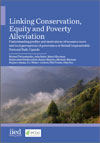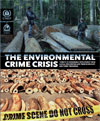-
Effective Conservation Efforts Must Recognize Livelihoods, Participatory Decision-Making, Research Finds
September 11, 2014 By Heather Randall A new report from the International Institute for Environment and Development seeks to understand why Uganda’s Bwindi Impenetrable National Park continues to be exploited despite park officials’ implementation of “integrated conservation and development” (ICD) efforts. The study finds that local people’s perceptions of the benefits of the integrated conservation and development vary depending on five primary factors: age, level of education, homestead distance to the national park, quality of life, and wealth. Wealthier individuals, who were also more likely to participate in a special program which allows certain local users to harvest limited resources from the forest, reported feeling as though they had benefited more than poorer individuals. For poorer individuals, the park sometimes served as a hindrance to their livelihoods because it prevented them from hunting bushmeat or collecting firewood, building materials, medicinal plants, or honey without risking arrest. Ultimately, the researchers found the primary factor present in successful ICD projects was the involvement of local people in the decision-making and implementation processes. Equal collaboration between community members and external actors paves the way for projects to both counter exploitation of natural resources and alleviate poverty in communities surrounding the park.
A new report from the International Institute for Environment and Development seeks to understand why Uganda’s Bwindi Impenetrable National Park continues to be exploited despite park officials’ implementation of “integrated conservation and development” (ICD) efforts. The study finds that local people’s perceptions of the benefits of the integrated conservation and development vary depending on five primary factors: age, level of education, homestead distance to the national park, quality of life, and wealth. Wealthier individuals, who were also more likely to participate in a special program which allows certain local users to harvest limited resources from the forest, reported feeling as though they had benefited more than poorer individuals. For poorer individuals, the park sometimes served as a hindrance to their livelihoods because it prevented them from hunting bushmeat or collecting firewood, building materials, medicinal plants, or honey without risking arrest. Ultimately, the researchers found the primary factor present in successful ICD projects was the involvement of local people in the decision-making and implementation processes. Equal collaboration between community members and external actors paves the way for projects to both counter exploitation of natural resources and alleviate poverty in communities surrounding the park. Similar livelihoods-conservation clashes emerge in a new report by the United Nations Environment Program. The Environmental Crime Crisis details the challenges associated with effectively combating wildlife trafficking and forest crimes, identifying a number of drivers that go beyond what conservation programs typically address, including corruption, corporate crime, national and regional conflict, lack of legislation and law enforcement, mafia activity, and increasing demand for high-value animal and forest products. Development efforts could be a potential response, as the report cites one unconfirmed example of an underpaid park ranger in Mozambique who led a group of poachers to the last rhinos in the country for a mere $80. The report notes that “the pace, level of sophistication, and globalized nature of the illegal trade in wildlife is beyond the capacity of many countries and individual organizations to address” and calls on international actors to strengthen their responses. Beyond strengthening institutional capacity and legal and regulatory systems, UNEP also suggests designing and implementing certification systems so consumers can be made aware of the origins of the products they buy.
Similar livelihoods-conservation clashes emerge in a new report by the United Nations Environment Program. The Environmental Crime Crisis details the challenges associated with effectively combating wildlife trafficking and forest crimes, identifying a number of drivers that go beyond what conservation programs typically address, including corruption, corporate crime, national and regional conflict, lack of legislation and law enforcement, mafia activity, and increasing demand for high-value animal and forest products. Development efforts could be a potential response, as the report cites one unconfirmed example of an underpaid park ranger in Mozambique who led a group of poachers to the last rhinos in the country for a mere $80. The report notes that “the pace, level of sophistication, and globalized nature of the illegal trade in wildlife is beyond the capacity of many countries and individual organizations to address” and calls on international actors to strengthen their responses. Beyond strengthening institutional capacity and legal and regulatory systems, UNEP also suggests designing and implementing certification systems so consumers can be made aware of the origins of the products they buy.Sources: International Institute for Environment and Development, United Nations Environment Program.
Topics: Africa, conservation, development, environment, Mozambique, poverty, Reading Radar, Uganda, UN
 A Publication of the Stimson Center.
A Publication of the Stimson Center.





